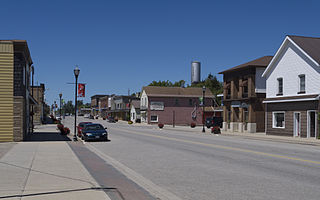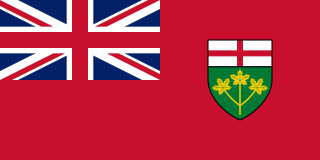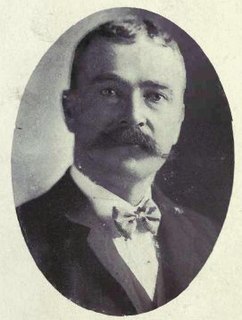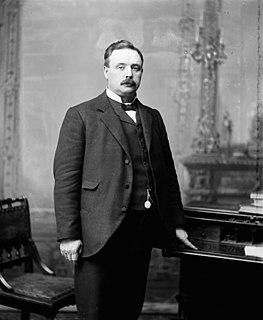George William McDonald (November 20, 1875 – April 6, 1950) was a politician in Manitoba, Canada. He served in the Legislative Assembly of Manitoba from 1915 to 1922 as a member of the Manitoba Liberal Party, and later sat in the House of Commons of Canada from 1935 to 1940 as a Liberal-Progressive. [1]

Manitoba is a province at the longitudinal centre of Canada. It is often considered one of the three prairie provinces and is Canada's fifth-most populous province with its estimated 1.3 million people. Manitoba covers 649,950 square kilometres (250,900 sq mi) with a widely varied landscape, stretching from the northern oceanic coastline to the southern border with the United States. The province is bordered by the provinces of Ontario to the east and Saskatchewan to the west, the territories of Nunavut to the north, and Northwest Territories to the northwest, and the U.S. states of North Dakota and Minnesota to the south.

The Legislative Assembly of Manitoba and the Queen of Canada in Right of Manitoba, represented by the Lieutenant Governor of Manitoba form the legislature of the Canadian province of Manitoba. Fifty-seven members are elected to this assembly in provincial general elections, all in single-member constituencies with first-past-the-post voting. The Manitoba Legislative Building is located in central Winnipeg, at the meeting point of the Wolseley and Fort Rouge constituencies.

The Manitoba Liberal Party is a political party in Manitoba, Canada. Its roots can be traced to the late nineteenth-century, following the province's creation in 1870.
McDonald was born in Lucknow, Ontario, [1] the son of Donald McDonald and Mary McKenzie, and was educated in Kincardine. After completing his schooling, he taught school in Kinloss. [2] He later moved to Manitoba, and worked as an agricultural implement dealer and insurance agent in Boissevain. [3] In 1914, he married Jennie M. Taylor. [2]

Lucknow is a community located in Bruce County, Ontario, Canada. It is incorporated in the Township of Huron-Kinloss.

Ontario is one of the 13 provinces and territories of Canada and is located in east-central Canada. It is Canada's most populous province accounting for 38.3 percent of the country's population, and is the second-largest province in total area. Ontario is fourth-largest jurisdiction in total area when the territories of the Northwest Territories and Nunavut are included. It is home to the nation's capital city, Ottawa, and the nation's most populous city, Toronto, which is also Ontario's provincial capital.

Kincardine is a municipality located on the shores of Lake Huron in Bruce County in the province of Ontario, Canada. The current municipality was created in 1999 by the amalgamation of the Town of Kincardine, the Township of Kincardine, and the Township of Bruce.
He first sought election to the Manitoba legislature in the 1914 campaign, but lost to Conservative incumbent James Johnson by 62 votes. In 1915, the Conservative government of Rodmond Roblin was forced to resign amid a corruption scandal. A new election was held, which the Liberals won in a landslide. [4] McDonald was elected for Turtle Mountain, defeating Johnson [5] by 36 votes. In the legislature, he served as a backbench supporter of Tobias Norris's government.
The Progressive Conservative Party of Manitoba is a right-of-centre political party in Manitoba, Canada and the only right-leaning party in the province. It is currently the governing party in the Legislative Assembly of Manitoba, after winning a substantial majority in the 2016 provincial election.
James Johnson was a politician in Manitoba, Canada. He served in the Legislative Assembly of Manitoba from 1897 to 1915, as a member of the Conservative Party. Johnson was a cabinet minister in the government of Hugh John Macdonald, and was named speaker of the assembly in 1904.

Sir Rodmond Palen Roblin, was a businessman and politician in Manitoba, Canada.
The Liberals were reduced to a minority government in the 1920 provincial election. McDonald faced a serious challenge in Turtle Mountain from new Conservative leader Richard G. Willis, but retained his seat by sixteen votes (1,022 to 1,006). He did not seek re-election in 1922. [5]
A minority government, or minority cabinet or minority parliament, is a cabinet formed in a parliamentary system when a political party or coalition of parties does not have a majority of overall seats in the parliament. It is sworn into office, with or without the formal support of other parties, to enable a government to be formed. Under such a government, legislation can only be passed with the support of enough other members of the legislature to provide a majority, encouraging multi-partisanship. In bicameral parliaments, the term relates to the situation in chamber whose confidence is considered most crucial to the continuance in office of the government.
He was mayor of Boissevain from 1924 to 1926 and served on the town council from 1929 to 1935. [1]
McDonald returned to political life in the 1935 federal election, winning the rural Manitoba riding of Souris as a Liberal-Progressive by only three votes (3,504 to 3,501). Ironically, he won this election by defeating incumbent Conservative Errick French Willis, the son of Richard G. Willis. Although he was not formally a member of the Liberal Party of Canada caucus, McDonald served as a backbench supporter of William Lyon Mackenzie King's Liberal government for the next five years. [6]
Souris was a federal electoral district in the province of Manitoba, Canada, that was represented in the House of Commons of Canada from 1904 to 1953.
Liberal-Progressive was a label used by a number of candidates in Canadian elections between 1925 and 1953. In federal and Ontario politics, there was no Liberal-Progressive party: it was an alliance between two parties. In Manitoba, a party existed with this name.

The Liberal Party of Canada is the oldest and longest-serving governing political party in Canada. The Liberals form the current government, elected in 2015. The party has dominated federal politics for much of Canada's history, holding power for almost 69 years in the 20th century—more than any other party in a developed country—and as a result, it is sometimes referred to as Canada's "natural governing party".
He was defeated in the 1940 campaign in which he ran as a straight Liberal, losing to "National Government" candidate J. Arthur Ross by 130 votes. [6] He did not seek a further return to politics after this time.
McDonald died at home in Boissevain at the age of 74. [3]



